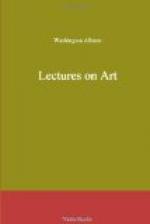Now the question is, whether the pleasurable emotion, which is, so to speak, the indigenous growth of Truth, can in any case be free of self, or some personal gratification. To this, we apprehend, there will be no lack of answer. Nay, the answer has already been given from the dark antiquity of ages, that even for her own exceeding loveliness has Truth been canonized. If there was any thing of self in the Eureka of Pythagoras, there was not in the acclamations of his country who rejoiced with him. But we may doubt the feeling, if applied to him. If wealth or fame has sometimes followed in the track of Genius, it has followed as an accident, but never preceded, as the efficient conductor to any great discovery. For what is Genius but the prophetic revealer of the unseen True, that can neither be purchased nor bribed into light? If it come, then, at all, it must needs be evoked by a kindred love as pure as itself. Shall we appeal to the artist? If he deserve the name, he will disdain the imputation that either wealth or fame has ever aided at the birth of his ideal offspring: it was Truth that smiled upon him, that made light his travail, that blessed their birth, and, by her fond recognition, imparted to his breast her own most pure, unimpassioned emotion. But, whatever mixed feeling, through the infirmity of the agent, may have influenced the artist, whether poet or painter, there can be but one feeling in the reader or spectator.
Indeed, so imperishable is this property of Truth, that it seems to lose nothing of its power, even when causing itself to be reflected from things that in themselves have, properly speaking, no truth. Of this we have abundant examples in some of the Dutch pictures, where the principal object is simply a dish of oysters or a pickled herring. We remember a picture of this kind, consisting solely of these




